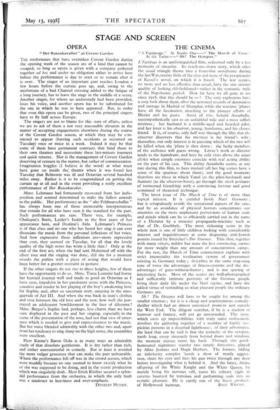THE CINEMA
" L'Equipage." At Studio One-" The March of Tittle." At the Tatler-" Sh! The Octopus."
L'Equipage is an undistinguished film, redeemed only by a few moments of sincerity. Its reach-me-down story, which takes the usual triangle theme into a front-line aerodrome during the last War, retains little of the élan and none of the perspicacity of Kessel's novel, on which it is based. The war scenes, no more and no less effective than usual, have the one sinister quality of looking old-fashioned—rather in the romantic style of the Napoleonic period. How far have we all gone in sin since 1918, that this should be so ? The very explosions have a cosy look about them, after the newsreel records of detonation and carnage in Madrid or Shanghai, while the wartime 'planes have all the fascination attaching to the pioneer efforts of Bleriot and his peers. Amid all this, behold Annabella, unsympathetically cast as an unfaithful wife and a most selfish mistress ; her husband is a middle-aged and bearded pilot, and her lover is his observer, young, handsome, and his closest friend. It is, of course, only half way through the film that the observer discovers that his mistress is his friend's wife ; thereafter, our only interest is in guessing which of the two will be killed when the 'plane is shot down ; the lucky members of the audience will guess wrong. Litvac's work as director tends to the humdrum, and here he only rises above the usual clichés when simple emotions coincide with real acting ability on the part of his cast. This ability Annabelle seems, at any rate during this film, to have mislaid (all her big scenes have a sense of the spurious about them), and the good moments therefore are those in which Vanel (as the pilot-husband) and Aumont (as the observer-lover), go through the stock postures of tormented friendship with a convincing fervour and good command of theatrical technique.
The latest issue of The March of Time is of more than topical interest. It is entitled Inside Nazi Germany but it scrupulously avoids the sensational aspects of the case, and by an avoidance of physical horrors concentrates our attention on the more unpleasant perversions of human souls and minds which can be so efficiently carried out in the name of a Dictator by a monster propaganda-machine such as that of Dr. Goebbels. The most sickening scene in the whole item is one of little children looking with considerable interest and inquisitiveness at some disgusting anti-Jewish posters issued by Streicher's Der Sturmer. This shot, together with many others, milder but none the less convincing, carries far more weight than any amount of concentration camps. For the rest, the March of Time commentator explains with strict impartiality the totalitarian system of government existing in Germany today ; describes in the same sing-song tone of voice the advantages of fitness-systems and the dis- advantages of guns-without-butter ; and is not sparing of interesting facts. Most of the scenes are well-photographed and sufficiently intimate portraits of the German people living their daily life under the Nazi regime, and have the added virtue of reminding us what pleasant people the ordinary Germans are.
Sh ! The Octopus will have to be sought for among the smaller cinemas ; for it is a cheap and unpretentious comedy- thriller which had an almost unnoticed premiire just outside the. West End. The diligent searcher, if he is a student of humour and fantasy, will not go unrewarded. The story, which casts up impossibilities with truly naive enthusiasm, involves the gathering together of a number of highly sus- picious persons in a deserted lighthouse ; of their adventures, the least that can be said is that the tentacles of the octopus, yards long, creep sinuously from behind doors and windows the moment anyone turns his back. Through this good- humoured nightmare wander two simple detectives, played by Allan Jenkins and Hugh Herbert. The former, hiding an inferiority complex 'neath a show of manly aggres- sion, shuts his eyes and fires his gun twice through any door before investigating what is behind it. And the latter, divine offspring of the White Knight and the White Queen, by merely being his nervous self, turns his solitary vigils in caverns haunted by tortoises and performing seals into an ecstatic pleasure. He is surely one of the finest products














































 Previous page
Previous page